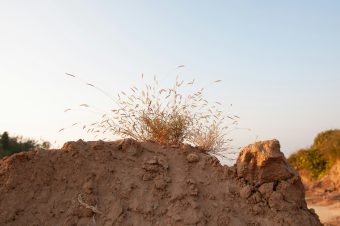
UNESCO is warning that 90 per cent of the planet’s land surface could be degraded by 2050, with major risks for biodiversity and human life. At an international conference in Agadir (Morocco), Audrey Azoulay, Director-General of UNESCO, appealed to the Organization’s 194 Member States to improve soil protection and rehabilitation. UNESCO is also undertaking a number of actions to fill the scientific knowledge gaps in this field.
Healthy soils are essential for maintaining ecosystems and biodiversity, regulating the climate, producing food and purifying water. However, according to the World Atlas of Desertification, 75 per cent of them are already degraded, directly impacting 3.2 billion people. And if current trends continue, this proportion will rise to 90 per cent by 2050.
Against this worrying backdrop, UNESCO and the Kingdom of Morocco’s National Agency for the Development of Oasis and Argan Zones (ANDZOA) organized the international conference on soil on Monday 1er July in Agadir, bringing together experts and representatives from over thirty countries. The discussions have led to an action plan based on three key objectives: improving soil protection and rehabilitation, filling the scientific knowledge gaps in this field, and strengthening the commitment of young people and communities through education and training programmes.
More:
- SOIL HEALTH: PARLIAMENT SETS OUT MEASURES TO ACHIEVE HEALTHY SOILS BY 2050
- UNEP AND MINISTRY OF ENVIRONMENT SIGN AGREEMENT TO REINFORCE ENVIRONMENTAL ACTION IN BRAZIL
- SUPPORT FOR FARMERS: COUNCIL ENDORSES TARGETED REVIEW OF THE COMMON AGRICULTURAL POLICY
A soil health index and a pilot programme
UNESCO will support its Member States by establishing a “world soil health index” in coordination with its international partners. This index will be a standardized measure for assessing and comparing soil quality across different regions and ecosystems. It will allow the identification of trends showing degradation or improvement, reveal which areas are most at risk, and enable better understanding the effectiveness of soil management practices.
In addition to this index, UNESCO will launch a pilot initiative for the sustainable management of soils and landscapes in around ten natural sites that it helps to protect under its Biosphere Reserves programme. The goal will be twofold: to assess the effectiveness of the management methods implemented in these sites, and to work to ensure that the best of these methods can be deployed in other regions of the world.
Site managers will be encouraged to develop innovative soil conservation and land management projects. Training will be provided for them, as well as for members of government agencies, conservation organizations and indigenous communities, to give them as many tools as possible to protect this essential resource. This initiative will also include an educational component through which UNESCO will raise awareness and involve the younger generations.
Source: UNESCO

